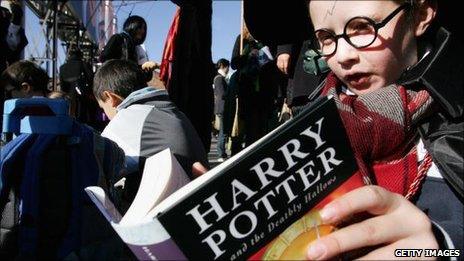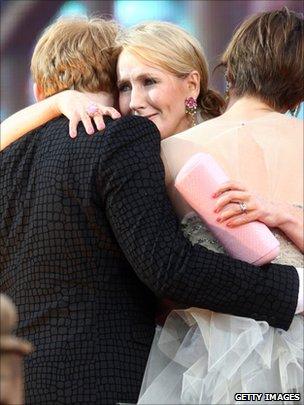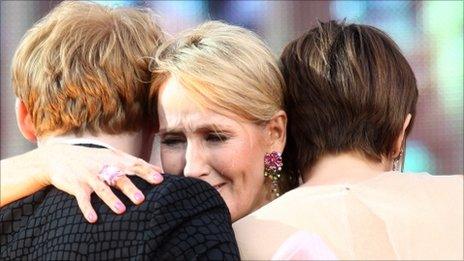The End of Harry Potter? It’s Hardly Begun
- Published
- comments

In 1959 Elvis Presley released an album called 50,000,000 Elvis Fans Can't be Wrong, external.
A title (and cover) The Fall parodied for their 2004 greatest hits album, 50,000 Fall Fans Can't be Wrong, external.
The implicit message with both was: argumentum ad populum. Which makes me think of Harry Potter.
Not of one of his spells, but as a reason for his fame.
Argumentum ad populum is the term used to describe the situation when we find ourselves being influenced by popular opinion. Call it peer pressure, call it jumping on the bandwagon, or - if you're Chinese - you might refer to the Three Men Make a Tiger proverb (if two people told you that a tiger was running in the street you wouldn't believe them, but if a third confirmed the sighting then you would accept it as the truth).
A sequel?
There is no doubt that the original Harry Potter fad benefited from the argumentum ad populum phenomena: children are even more prone to it than adults. My (then) six-year old boy loved the book and everything associated with it.
The wand, the duvet cover, the toys (the Quidditch board with air shoots was good); the backpacks. If he'd got his way his bedroom would have out-purpled Prince's dressing up box.

Was this really the end?
But the initial craze doesn't explain the little wizard's continued success.
And it is extraordinary. Over 400 million Harry Potter books have been sold, which have been translated into more than 65 languages (including ancient Greek and Gaelic) and led to the most lucrative movie franchise of all time. And then there's the softer stuff such as getting young boys reading, making Latin cool again and almost single-handedly creating an Oscar-winning special effects industry in Britain.
People knock JK Rowling's literary talents. Some say her books have crater-like plot holes, others that she ran out of ideas early on, and several have pointed to Dahl, Tolkien and Lewis saying she's a bit like them, but not as good. Well, she's got something.
In fact she's got the one thing that novelists crave more than anything else: the ability to create characters that readers care about.
The turn-out on Thursday night in London's Trafalgar Square for the premiere of Harry Potter and the Deathly Hallows (Part 2) was testament to that.
Thousands of people, from across the world, gathered over several rainy days to scream their thanks to JK Rowling. Is there another author with that sort of pulling power? She was clearly taken aback.
And in a tearful, highly-emotional state said: "Oh. All right I will write another one then". She quickly clarified the statement and said she was joking. I'm not so sure.
I don't think she'll write another Harry Potter book, I think she'll write several. The motivation won't be money; she doesn't need that, or fame, she didn't want it in the first place. It will be because she's a writer. And writers have to write.
'Shooting ducks'
Of course she could write anything she wants to and might well produce a book that has nothing at all to do with wizards, but that does not exclude her from writing more Potter. Turn it around: why wouldn't she write more Potter?
She is young. Magic will remain a popular area; it plays to the idea of a higher life force and gives the imagination a chance to escape the prison of reality for an hour or two.
She has some decent universal themes embedded in the stories: David (Harry Potter) versus Goliath (Voldemort), goodies and baddies, sex and death. And the Americans can't get enough of the pre-War Britain and boarding school thing.
JK Rowling on the "extraordinary" send-off for the Harry Potter films
Her readership wants to know what happens next to the group of characters to which they have developed a romantic attachment.
And I am sure those characters will be ever-present in her head; always popping up to suggest a situation to her, which, I expect, she'll be jotting down. And the way she has left the story at the moment is perfectly set up for future episodes: two unaccounted for decades, a bunch of assumptions about the characters that she can play with, and a new generation. Irresistible.
The question for me is not will she write more Potter, but how she takes the story forward (or backwards).
So far Harry has aged with each book, closely mirroring the development from child to teenager of many of the readers. If she continues that self-imposed orthodoxy it will mean future books will have to be written with adults as well as children in mind.
That won't be easy. JK Rowling is a proven writer of children's books, but not of adult fiction.
Alternatively she could keep Harry and his mates at their present age, after all Bond never aged.
Or she could start all over again with their children. That might risk falling into the trap that Steven Spielberg said he had avoided by not taking on the directing duties for the Potter movies, saying "I purposely didn't do the Harry Potter movie because for me, that was shooting ducks in a barrel…it's just a slam dunk.
"It's just like withdrawing a billion dollars and putting it into your personal bank account. There's no challenge."
The challenge for JK Rowling is who does she write for: Potter's kids or his contemporaries. She could do both.
Or even take the life of one of the other characters and develop it in a new direction, as was the case when the sitcom Frasier was rolled-out of Cheers. Mind you that is not necessarily a formula for success as Friends spin-off Joey proved.
Whatever happens, she is unquestionably talented. I mean, 400,000,000 readers can't be wrong can they?
- Published7 July 2011

- Published7 July 2011